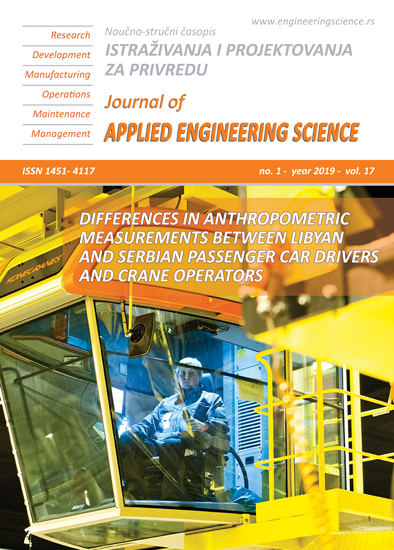PITFALLS AND DRAWBACKS IN ENGINEERING EDUCATION IN RUSSIA
Abstract
The financial and economic crisis of 2008-2009 was the first call, which was to make the Russian society to focus on important issues, one of which is the quality of education as a basis for creating and sustaining an innovation ecosystem. Investment in education and the development of the necessary competencies are crucial in improving the competitiveness of the country: these are the competences of graduates that determine the potential productivity of the territory. Russia is facing the challenge of creating the type of economy that would enable attracting highly educated and skilled workers. This initiative is reflected in the federal document - the Conceptual of the Federal Action Programme for the Development of Education for 2016-2020 [1], which determines the quality and competitiveness of the Russian education as the prerogative of the state policy.
The paper describes the current state of the educational market on the territory of the Bologna process members. It provides a comparative analysis of the effectiveness of the system of higher education in Russia with countries leading in the Global Innovation Index. The authors determined the range of problems associated with the ‘insufficient effectiveness’ of the educational system in Russia. Moreover, the authors proposed the view for establishing the policy aiming at development of innovative ecosystem.
References
Federal Action Programme for the Development of Education for 2016-2020 https://минобрнауки.рф/%D0%B4%D0%BE%D0%BA%D1%83%D0%BC%D0%B5%D0%BD%D1%82%D1%8B/5930/%D1%84%D0%B0%D0%B9%D0%BB/4787/FCPRO_na_2016-2020_gody.pdf.
Federal Law “On Education in the Russian Federation” dated 29 December 2012. http://www.consultant.ru/document/cons_doc_LAW_140174/.
Burton R. Clark. Creating Entrepreneurial Universities: Organizational Path-ways of Transformation // Higher Education. — 1999, Volume 38, Issue 3, pp 373-374.
John L.Davies. The Emergence of Entrepreneurial Cultures in European Universities // Higher Education Management Vol.13 – No.2, pp 25-44.
Lengnick-Hall, M.L. Human Resource Management in the Knowledge Economy // Lengnick-Hall M.L., Lengnick-Hall C.A. San-Francisco: Berrett-Koehler, 2003. - P. 53-65.
Coates, D. The Knowledge Driven Economy: Analyses and Background / Coates D., Warwick K. DTI, 1999. - 43 p.
ESU (The European Students' Union), 2014. Student Advancement of Graduates Employability: Employability With Students’ Eyes. [pdf]. Available at: http://www.sage.esunline.org/SAGE+results+and+publications.
EUA, 2013. Internationalisation in European higher education: European policies, institutional strategies and EUA support. Brussels: EUA.
European Commission, 2013a. The impact of the economic crisis on the situation of women and men and on gender equality policies. Luxembourg: Publications Office of the European Union.
European Commission, 2013b. Communication from the Commission to the European Parliament, the Council, the European Economic and Social Committee and the Committee of the Regions: European higher education in the world. COM (2013) 499 final.
European Commission, 2013c. Communication from the Commission to the European Parliament, the Council, the European Economic and Social Committee and the Committee of the Regions. Opening up Education: Innovative teaching and learning for all through new Technologies and Open Educational Resources. COM(2013) 654 final.
Report by the structural reforms working group to the Bologna Follow-up Group [Electronic resource] // Available at: URL:http://www.ehea.info/Uploads/SubmitedFiles/12_2014/154923.pdf.
Tarasova A.N. Konceptualnie podkhodi k formirovaniu kulturi predprinimatelstva v obrazovatelnikh organizatsiykh [Conceptual approaches to establishing entrepreneurial culture in HEIs] // Innovatsionnie tekhnologii upravleniya i prava [Innovative technologies of management and law] // Scholarly journal. 2015. - 3 (13). – pp.19-27.
Lengnick-Hall, M.L. Human Resource Management in the Knowledge Economy / Lengnick-Hall M.L., Lengnick-Hall C.A. San-Francisco: Berrett-Koehler, 2003. - P. 53-65.
World Bank: Cross-country comparison Electronic resource. – 2014. – Available at: http://info/worldbank.org/etools/kam/LAM_page9.asp.
The Global Innovation Index 2011. Accelerating Growth and Development. Electronic resource. Available at: https://www.globalinnovationindex.org/userfiles/file/GII-2011_Report.pdf.
The Global Innovation Index 2012. Stronger Innovation Linkages for Global Growth. Electronic resource. Available at: http://www.wipo.int/edocs/pubdocs/en/economics/gii/gii_2012.pdf.
The Global Innovation Index 2013. The Local Dynamics of Innovation. Electronic resource. Available at: http://www.wipo.int/edocs/pubdocs/en/economics/gii/gii_2013.pdf.
The Global Innovation Index 2014. The Human Factor in Innovation. Electronic resource. Available at: https://www.globalinnovationindex.org/userfiles/file/reportpdf/GII-2014-v5.pdf.
The Global Innovation Index 2015. Effective Innovation Policies for Development. Electronic resource. Available at: https://www.globalinnovationindex.org/userfiles/file/reportpdf/GII-2015-v5.pdf.
Ensuring efficiency control of institutional environment of the cluster / N.I. Larionova, T.V. Yalyalieva, D.L. Napolskikh // American Journal of Applied Sciences – 11 (9) – P. 1594-1597, 2014. doi: 10.3844/ ajassp.2014. 1594.1597 Published Online: http://thescipub.com/abstract/10.3844/ajassp.2014.1594.1597
Governmental control of the formation efficiency of educational clusters at the regional level / N.I. Larionova, T.V. Yalyalieva, D.L. Napolskikh and V.E. Shebashev //American Journal of Applied Sciences - 11 (10) – P. 1761-1765, 2014 doi:10.3844/ajassp.2014.1761.1765 Published Online: http://thescipub.com/abstract/10.3844/ofsp.9489
Enright, M., (1996). "Regional Clusters and Economic Development: A Research Agenda. In: Business Networks: Prospects for Regional Development",Walter, D.G. (Ed.)., Berlin, ISBN10: 3110151073, pp: 190-213.
Larionova, N. I.,.Napolskikh, D. L and. Yalyalieva, T.V. (2015) " Theoretical approaches to improving Government control systems for educational Clusters development", Actual problems of economics. No. 4, pp. 285-288.

